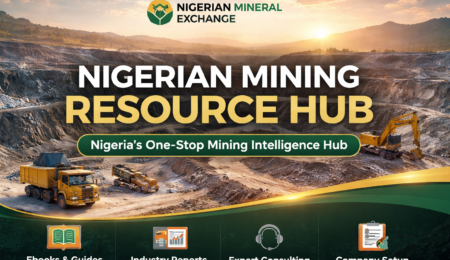The Nigerian mining industry is quietly becoming one of the most attractive frontiers for global investors. With over 44 mineral types across 500 locations, a growing demand for strategic minerals like gold and lithium, and government incentives to diversify away from oil, the sector presents opportunities that are too big to ignore.
Yet, for most foreign investors, the question isn’t “Should I invest in Nigeria’s mining sector?” – it’s “How do I do it safely, profitably, and with confidence?”
In this guide, we’ll walk you through the step-by-step process of investing in Nigerian mining, covering everything from understanding the landscape to securing vetted projects and building profitable partnerships.
Step 1: Understand the Nigerian Mining Landscape
Nigeria’s mining sector is divided into three main scales:
- Small-scale mining – Often artisanal, high risks, and usually semi-formal to informal.
- Medium-scale mining – Legally structured, with room for partnerships and significant returns.
- Large-scale mining – Capital-intensive operations, often led by established multinationals.
For most foreign investors, the medium scale is the sweet spot: big enough to generate revenue, small enough to be flexible, and open to joint ventures with trusted local operators.
👉Resource: Our consultancy service, The Nigerian Mining Investment Navigator, transforms the complex process of investing in Nigeria’s mining and mineral trade into a secure, transparent, and profitable venture. We connect investors to vetted projects that are legally compliant and investment-ready, guiding you from project discovery and mineral availability to final due diligence, and ensuring every step is built on a foundation of trust, compliance, and security.
Step 2: Know the Minerals Driving Global Demand
Nigeria is rich in minerals that align with the global energy transition and industrial demand. Key investment drivers include:
- Gold – Long-standing safe haven for investors, with deposits in Osun, Kebbi, Niger, Kaduna, and Zamfara.
- Lithium – High global demand for batteries, with Nigeria emerging as a hotspot in Nasarawa and Kogi.
- Gemstones – Sapphires, tourmaline, aquamarine, and others are highly sought after in the jewelry market.
- Rare earths and industrial minerals – Strategic inputs for tech, defense, and manufacturing.
👉 Want a complete breakdown of mineral opportunities? Check out our ebook, Unlocking Nigeria’s Mineral Wealth: 113 Lucrative Business Ideas, a comprehensive guide for entrepreneurs and investors.

Step 3: Conduct Due Diligence (Non-Negotiable)
One of the biggest risks in mining is entering blind. Nigeria is no exception. Before signing any deal:
- Verify mining licenses and titles with the Mining Cadastre Office (MCO).
- Assess geological data to confirm actual mineral deposits.
- Check community relations and land rights – poor relationships can derail projects.
- Evaluate the financial and operational viability of the company.
👉 Through our Investment Navigator, we handle these checks for you – from legal verifications and site visits to full financial and technical due diligence.
Step 4: Choose the Right Entry Model
Foreign investors typically enter Nigerian mining through:
- Equity Investment – Buying shares in an existing mining company.
- Joint Venture (JV) – Partnering with a local company to share resources, risks, and profits.
- Acquisition – Acquiring a licensed mining site or company outright.
- Service Setup – Creating a support company for mineral trade, logistics, or export.
👉 If you’re interested in setting up a fully registered mining or mineral trading company in Nigeria, we offer a tailored service: Mining & Mineral Trading Company Setup (Nigeria). We streamline the legal, regulatory, and structural process so you can focus on growth.
Step 5: Navigate Community Relations and CSR
No mining investment succeeds without the community. In Nigeria, host communities are powerful stakeholders. Smart investors adopt Corporate Social Responsibility (CSR) measures early: employment opportunities, social projects, and fair land use. This builds long-term trust and minimizes disruptions.
Step 6: Secure Government and Regulatory Compliance
To operate legally, investors must:
- Obtain necessary permits (exploration, mining lease, export permits).
- Pay statutory fees and royalties.
- Comply with environmental regulations.
Non-compliance leads to license revocation, fines, and reputational damage.
Step 7: Partner with Trusted Local Experts
Nigeria is an emerging but complex mining market. The right local partner makes all the difference – helping you navigate bureaucracy, connect with local stakeholders, build trust, and avoid pitfalls.
👉 Our Nigerian Mining Investment Navigator was created to serve exactly this purpose: guiding foreign investors step by step into profitable, legal, and transparent mining ventures in Nigeria.
📘 The Nigeria Mineral Trading & Licensing Blueprint (2026 Edition)
If you are serious about buying, selling, or trading minerals legally in Nigeria, you cannot afford to rely on guesswork, outdated advice, or hearsay. The regulatory environment is tightening fast, and costly mistakes now lead to permit denials, seizures, or permanent blacklisting.
That’s why we created The Nigeria Mineral Trading & Licensing Blueprint: 2026 Guide to Buying Center Licenses & Purchase Permits — an updated, clear, step-by-step, insider guide that shows you exactly how to obtain Mineral Buying Center Certificates, Purchase & Possession Permits, and related approvals without delays or regulatory traps.
This guide distills real regulatory procedures for 2026, compliance requirements, and practical insights used by serious operators — saving you months of confusion, wasted money, and avoidable risk.
If mineral trading is part of your business future, this blueprint is not optional — it’s protection.
Final Thoughts
The Nigerian mining industry offers massive untapped potential, but success requires knowledge, due diligence, and trusted local partners. Investors who rush in without guidance risk losing millions, while those who follow a structured process stand to unlock extraordinary returns.
If you’re serious about mining investment in Nigeria, the next step is clear:
👉 Book your Strategic Investment Consultation today through our Nigerian Mining Investment Navigator.
And for a broader entrepreneurial view of Nigeria’s mineral economy, don’t miss our ebook: Unlocking Nigeria’s Mineral Wealth: 113 Lucrative Business Ideas.
Your pathway to Nigeria’s mining opportunities starts now.
READ ALSO:





Leave a Reply